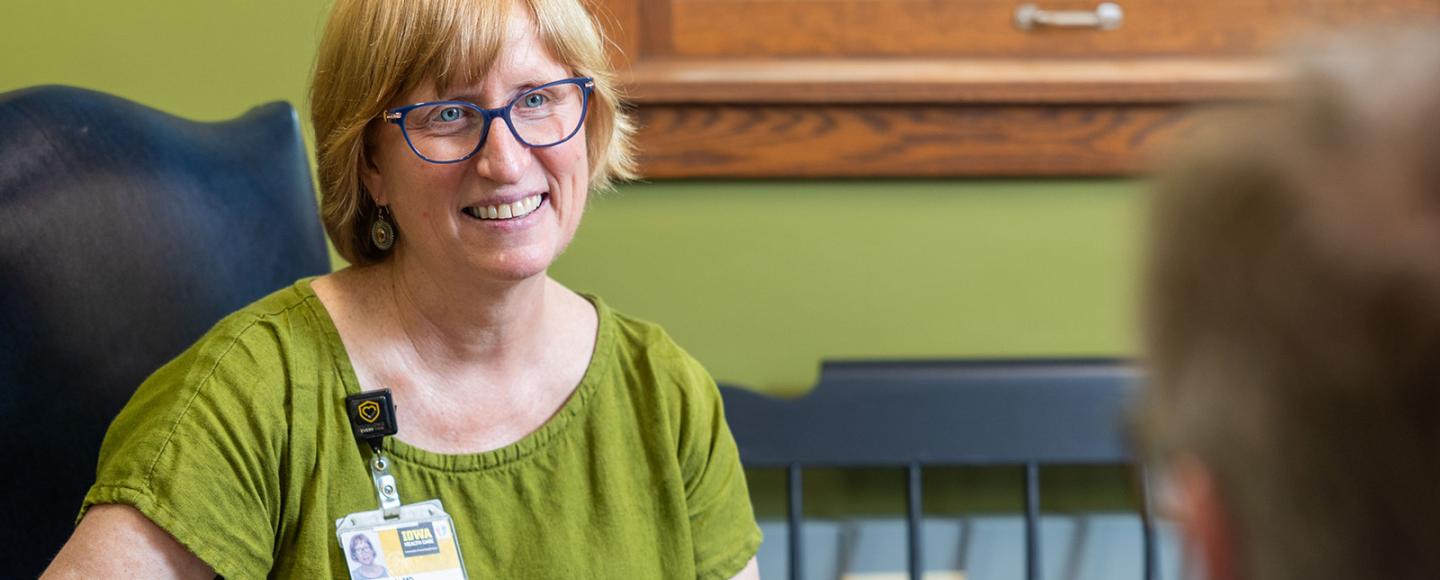Table of ContentsClose

Advocacy has been the driving force behind Alison Lynch’s career as an addiction medicine provider. She is a champion for her patients, who are often stigmatized or denied health care because of their medical condition.
Lynch, MD, MS, director of addiction medicine in the Department of Psychiatry, started UI Health Care’s first medication for addiction treatment clinic for substance use disorders. She’s also created a new addiction medicine fellowship program and trained providers across Iowa in prescribing medications to treat addiction. To her patients, Lynch delivers a clear and consistent message: Help is available and effective.
Now, she’s taking her advocacy work to the state level as the president-elect of the Iowa Medical Society–the largest professional association for Iowa physicians.
Medicine Iowa caught up with Lynch to discuss her new advocacy role.
You are the president-elect of the Iowa Medical Society and will become president in 2025. What are the IMS priorities for the year ahead?
A big priority that we have right now is the physician workforce because there are not enough physicians in Iowa. So, we're working with many different entities to try to address that. Our vision is to make Iowa the premier destination for physicians to live, work, and serve their communities.
We also want people to stay in Iowa and continue practicing. During COVID, a lot of people retired early, so we want to make it easier for a physician who's retired to come back and work part-time, if they want to. If we have retired providers who would be willing to work one day a week, we should make it easy for them to do that. We need their help.
Also, I think we can find more ways to demonstrate our vale to the whole state of Iowa. It would be really good for us to continue being involved in efforts to serve other counites really well.
Do you have any personal goals for your tenure as president?
I want to shine a light on mental health, in general, but substance use, in particular. We don't have enough addiction providers, and there are a lot of addiction issues in Iowa. So again, trying to work on reducing stigma so clinicians will want to learn more and take care of patients that they already see while also taking care of their addiction issues. Some of that is also about reimbursement. Addiction treatment doesn't pay very well, and there are opportunities on the state level where we could improve those payments. There have been some improvements recently with mental health reimbursement through Medicaid, but I think there's still more to do.
Much of the work you do as director of addiction medicine is expanding access to care. Tell me about your latest efforts in that mission? What are we doing at UI Health Care that’s unique to the state?
Something that we need to do on an ongoing basis is reduce stigma and recognize that addiction is a medical condition. We have a lot of really good treatments, but a lot of people don't have access to those treatments. If people don't feel safe asking for help or disclosing that they are struggling, they can't get treatment. I think we need more clinicians who are comfortable addressing these issues. Some of that requires education, and some of that's about having a well-staffed workforce.
We see many people with opioid use disorder, and we still mainly prescribe buprenorphine for them, and it works well. Every week I get to see people whose lives have been changed for the better because they have access to that treatment. So, we still have that foundation. And now, we're starting a methadone clinic as soon as we finalize clinic space. Methadone is just another really effective medication that can work for some people when buprenorphine doesn't work.
Also, we have added recovery coaches to our care team. These are people who are in recovery themselves, and they're hired because they have lived experience. They work in the clinic with us; they talk with patients. They do outreach with us, too. And they provide us with feedback and help us see blind spots.
We’ve also started a mobile clinic. On alternating weeks, I take a van to the parking lot of Heart of Iowa, which is a substance use treatment program for pregnant and parenting people, and the Lary Nelson Center, which is part of the Department of Corrections. I see people who are there—we sit in the van--and figure out what we need to do to help them, and prescribe medications.
We also have active grants for two training programs: a one-year addiction medicine fellowship program for physicians and a one-year addiction training program for nurse practitioners and physician assistants. We graduated our first class of PAs and nurse practitioners in July 2024.
You see problems, you see gaps, you see injustices, and you want to find a way to do something about it. I'm happier doing what I do now than I've ever been. People go into health care because they want to help people, and I feel like these efforts are helping people.

Iowa needs more doctors
The Iowa Medical Society is supporting five initiatives to expand the state’s physician workforce and aid in the recruitment and retention of physicians
